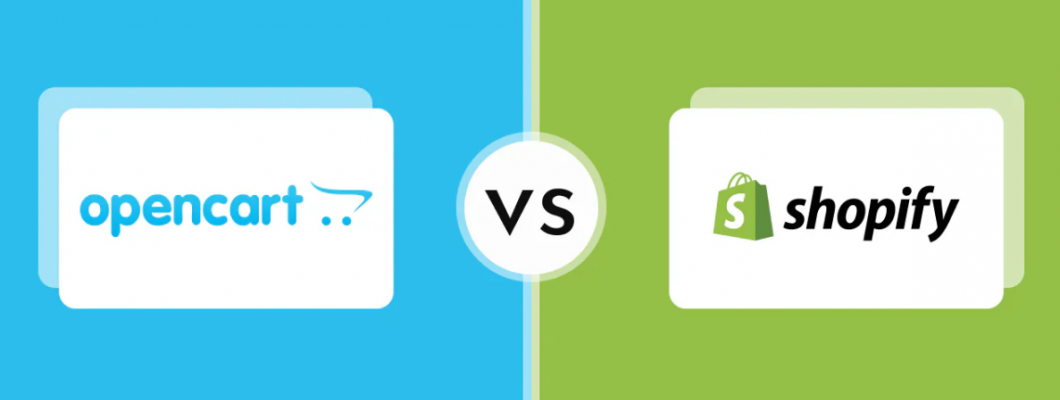
Starting an online store begins with a crucial decision: choosing the right e-commerce platform. With numerous options available, OpenCart and Shopify stand out as two of the most popular and widely used e-commerce solutions, each offering unique benefits that depend on your business goals, technical skills, and budget.
OpenCart is an open-source platform that provides complete control and customization, making it an ideal choice for developers or businesses that require a tailored solution. On the other hand, Shopify is a fully hosted, subscription-based platform known for its ease of use, quick setup, and all-in-one features. It’s perfect for entrepreneurs looking to launch and manage an online store without dealing with technical complexities.
Your choice between the two will affect key areas of your business, including design flexibility, scalability, SEO capabilities, maintenance, customer support, and overall cost. Whether you're just starting a small business or expanding a well-established brand, selecting the platform that aligns with your long-term needs is essential for success.
In this blog, we’ll walk you through a detailed comparison of OpenCart vs Shopify, helping you understand their strengths, differences, and which one is better suited for your specific e-commerce journey.
1. Overview of OpenCart and Shopify
What is OpenCart?
OpenCart is a free, open-source e-commerce platform built using PHP. It gives you full control over your website, with the flexibility to customize every aspect of your store. However, it requires hosting, technical setup, and ongoing management.
What is Shopify?
Shopify is a fully hosted, subscription-based platform designed for ease of use. It provides everything you need to build and run an online store—hosting, security, support, themes, and payment integration without requiring coding knowledge.
2. Ease of Use
Shopify: User-Friendly and Streamlined
Shopify is widely known for its beginner-friendly interface. It offers drag-and-drop design tools, pre-built themes, and intuitive dashboards. Setting up a store takes just a few clicks, making it ideal for users without technical expertise.
OpenCart: Flexibility with a Learning Curve
OpenCart provides more flexibility and control, but it demands more technical knowledge. Installation, plugin management, and updates often require developer support or manual handling. If you're tech-savvy or have access to development resources, OpenCart’s complexity can be an advantage.
Winner: Shopify (for beginners and ease of use)
3. Design and Customization
OpenCart: Full Design Control
Being open-source, OpenCart allows you to customize every element of your website. You can modify code, install third-party themes, and tweak your design down to the pixel, perfect for brands with specific design requirements.
Shopify: Beautiful Templates with Limited Code Access
Shopify provides a wide range of professionally designed themes, both free and paid. While it allows some code customization via its templating language (Liquid), it’s more restrictive compared to OpenCart.
Winner: OpenCart (for advanced customization), Shopify (for quick, polished designs)
4. Features and Extensions
Shopify Features:
Built-in SEO tools
Abandoned cart recovery
Multi-channel selling (Facebook, Instagram, Amazon)
Mobile app for store management
App Store with 8,000+ plugins
OpenCart Features:
Multi-store management
Unlimited products and categories
Integrated payment and shipping modules
Marketplace with 13,000+ extensions
Full source code access
Both platforms are extendable, but Shopify’s app ecosystem is more tightly curated, while OpenCart offers greater control over third-party integrations.
Winner: Depends on needs – Shopify for managed add-ons; OpenCart for maximum flexibility.
5. SEO and Marketing
OpenCart SEO:
OpenCart offers solid SEO features like custom URLs, meta tags, and product descriptions. However, it often requires plugins and manual configuration to achieve optimal results.
Shopify SEO:
Shopify comes SEO-optimized out of the box, with fast load speeds, mobile-friendliness, and easy-to-edit meta fields. It also integrates seamlessly with marketing tools like Google Analytics, Facebook Ads, and email marketing apps.
Winner: Shopify (for built-in tools), OpenCart (with customization)
6. Pricing
Shopify Pricing (Monthly):
Basic Plan: $39
Shopify Plan: $105
Advanced Plan: $399
Additional costs include app subscriptions, premium themes, and transaction fees if not using Shopify Payments.
OpenCart Pricing:
Software: Free
Hosting: ~$5–$30/month
Domain: ~$10/year
Extensions: Vary widely (some free, others $10–$200+)
Developer support: May incur extra costs
While OpenCart seems cheaper upfront, the total cost can increase based on hosting, add-ons, and maintenance. Shopify has predictable pricing but higher ongoing fees.
Winner: OpenCart (for budget flexibility), Shopify (for all-in-one pricing)
7. Security and Maintenance
Shopify: Hands-Off Security
Shopify handles security, backups, and compliance (like PCI-DSS for payments) automatically. It’s ideal for users who want to focus on their store and not the backend.
OpenCart: You’re in Charge
With OpenCart, you’re responsible for server security, updates, and backups. While this offers control, it also requires vigilance and possibly additional tools or professional services.
Winner: Shopify (for hassle-free security)
8. Support and Community
Shopify Support:
24/7 chat, email, and phone support
Extensive documentation and tutorials
Active user forums and Shopify Experts for hire
OpenCart Support:
Community forums
Official documentation
Paid commercial support
Developer support through freelancers
Shopify excels in customer service, while OpenCart relies more on the community and external experts.
Winner: Shopify (for dedicated support)
9. Scalability
Shopify:
Scales easily with built-in features and apps. Higher-tier plans support large volumes and complex needs. Ideal for growing businesses and enterprises.
OpenCart:
Highly scalable, but you may need a skilled developer to maintain performance as traffic and data grow.
Winner: Shopify (for effortless scaling), OpenCart (for tailored, developer-driven scaling)
10. Best Use Cases
Platform Best For
Conclusion
Choose Shopify if you want a fast, user-friendly, all-in-one solution with built-in hosting, security, and support. It’s ideal for entrepreneurs who prefer convenience and ease over technical control.
Choose OpenCart if you want complete control, open-source freedom, and are comfortable managing your own hosting and maintenance. It’s great for developers or businesses with very specific customization needs.
Ultimately, the right e-commerce platform depends on your business size, goals, technical ability, and budget. Both Shopify and OpenCart are powerful tools your ideal choice depends on how much control you're willing to trade for convenience.

Leave a Comment